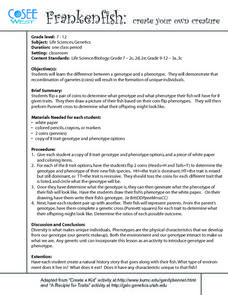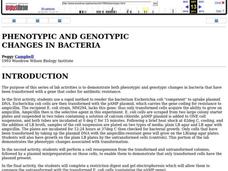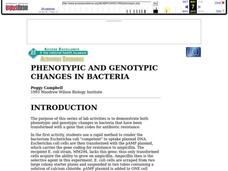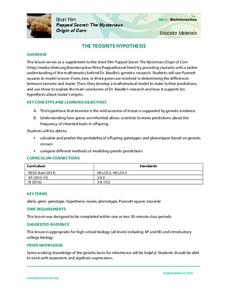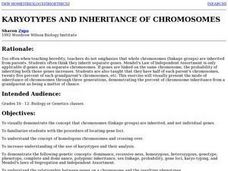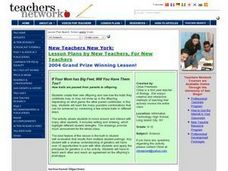Curated OER
"Easter" Egg Genetics
Using plastic Easter eggs to represent parent phenotypes, genetics enthusiasts simulate the passing of alleles. They record the phenotype of each half of the egg, one representing the mother's and one representing the father's. They...
Curated OER
Frankenfish
Students learn the difference between a genotype and a phenotype. They demonstrate that recombination of gametes (coins) will result in the formation of unique individuals.
Curated OER
Science Lesson for Grade 12
Twelfth graders perform dihybrid crosses and calculate phenotype and genotype ratios. In this series of science lessons, 12th graders explain the process of anodizing aluminum. They research on the benefits and harm caused by resonance...
Curated OER
Phenotypic and Genotypic Changes in Bacteria
Students investigate a rapid method to render the bacterium Escherichia coli "competent" to uptake plasmid DNA. They demonstrate the phenotypic changes associated with transformation. They perform a cell resuspension from the...
Curated OER
PHENOTYPIC AND GENOTYPIC CHANGES IN BACTERIA
Students use a rapid method to render the bacterium Escherichia coli "competent" in order to uptake plasmid DNA. They also have growth on the plain LB plates by the untransformed cells (which serve as controls). Students perform a cell...
Curated OER
Inheritance in Maize
Learners use mutant corn ears to investigate inheritance patterns. In this inheritance lesson plan, students count the number of corn kernels of each phenotype in mutant and wild type ears of corn. Learners calculate the ratio of...
Howard Hughes Medical Institute
The Teosinte Hypothesis
Don't want to sound corny, but your class will be a-maize-d by an engaging activity! Explore the history of the modern corn plant through a video and Punnett squares. Junior genetics experts get hands-on experience with actual research...
Curated OER
A Sputtering Image
Students explain the role of genes in heredity. In this biology activity, students predict the offspring's genotypes and phenotypes using the Punnett Square. They compute the probability of genotypes and phenotypes.
Curated OER
Making A Face
Learners are introduced to the cellular machinery assorts the pairs of chromosomes randomly and independently during meiosis. They are introduced to the rich genetic variation occurs as a result of the random and independent assortment...
Curated OER
Natural Selection
Young scholars practice calculating allele and genotype frequencies in the framework of a simple simulation using hard candy, calculators, and a worksheet. This lesson includes a three-page worksheet and an assessment question for...
Curated OER
Solving Genetic Puzzles
Seventh graders examine genetics combination using statistics. In this statistics lesson, 7th graders examine genetic trait using a table or punnett square to identify genotype and phenotype. This assignment requires more than one class...
Curated OER
Teacher Preparation Notes on Genetics
Students explore genetics through various hands-on activities. In this biology lesson, students predict the probability of offspring genotypes and phenotypes using the Punnett Square. They explain the causes of genetic abnormalities.
Curated OER
Dragon Genetics-Independent Assortment and Genetic Linkage
Students build chromosome models using popsicle sticks. In this biology lesson, students simulate the Law of Independent Assortment. They use Punnett squares to predict the resulting genotype and phenotype.
Curated OER
Blood Business
Students identify the different kinds of blood. In this biology instructional activity, students investigate the antigens, agglutinins and Rh factor using their own blood. They use Punnett squares to predict blood type of offspring.
Curated OER
Karyotypes and Inheritance of Chromosomes
Students explore the mode of inheritance of chromosomes. Given a scenario, students use the Human Genome sheet to determine inherited chromosomes. They illustrate the difference between genotype and phenotype. Students develop a model...
Curated OER
Genetics Mendelian
Students explore genetic terms, the Law of Dominance and the contributions of Gregor Mendel. After discussing Mendel's lab and his pea plants students observe examples of a phenotype chart. Afterward, they conduct their own lab to...
Curated OER
People Are Like Peas in a Pod
Students experiment with peapods to show the diversity of individual within a population. They examine dominant traits, recessive traits, genotypes, and phenotypes and show the process of making a Punnett Square.
Curated OER
The Electrophoresis of Human Hemoglobin
Students analyze different types of hemoglobin. They use the technique of agarose gel electrophoresis to separate human hemoglobin molecules according to their electrical charge, size, and/or shape. Students relate the migration of...
Curated OER
Apoptosis: Programmed Cell Death During Development
Students model the plasticity of neural pathways for memory in the brain. They simulate the cell activity according to dots on cards that they are given. They complete various simulations of different cell combinations.
Curated OER
Characterization of the Bioluminescence (Lux+) Gene E. coli
Students grow E. coli strain HB101, which contains the plasmid pUCD607 with the bioluminescence (Lux+) gene. The plasmid containing the Lux+ gene is isolated from the E. coli, then characterized by restriction analysis.
Curated OER
Heredity (Mendelian Genetics)
Students observe and record observations of whether a person is a taster or nontaster. They test selected individuals from their families and peer groups and chart all findings to determine which trait (e.g. taster or non-taster) is...
Curated OER
Genetics of Parenthood
Learners participate in an activity where they flip coins to determine which allele they pass on to the F1 generation and draw the resulting child's face. They identify several inheritance patterns including dominant, recessive,...
Curated OER
If Your Mom Has Big Feet, Will You Have Them Too?
Pupils describe and apply the Mendellian principles of genetics, focusing predominantly on dominant and recessive genes. They demonstrate how two parents contribute genes and how those genes appear in their offspring. They describe...
Curated OER
"Chips" Off the Old Block?
Students study using analogies between common items or occurrences and science concepts. They use the analogy of cookie recipes to that of the DNA "recipes" for living things to help us explain more about mutations.

